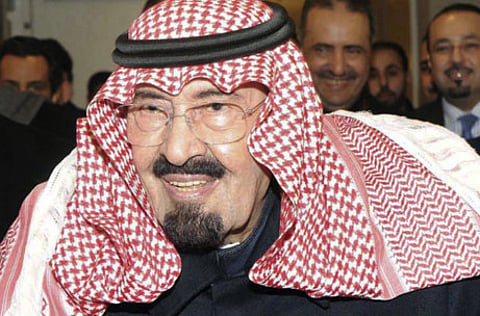King Abdullah: Legacy of reverence to the nation
King Abdullah’s reformist measures constitute a unique revolutionary process

Even if most Saudis recognised the significant progress recorded under the leadership of King Abdullah Bin Abdul Aziz, few appreciated the epochal reform decisions that provided and ensured a high standard of living, which also transformed and continue to change Saudi Arabia into the key Arab pivot in world affairs. For eight continuous years after his ascension to the throne, the Saudi monarch surprised many, as he honed on what truly mattered. While many will highlight economic achievements and overall developmental plans, which saw an average 8.2 per cent growth rate in the non-oil sector between 2005 and 2010, and the public debt ratio to GDP going from 39.2 per cent at the end of 2005 to 3.6 per cent by the end of 2012, far more enduring accomplishments were introduced.
These initiatives ranged from fundamental reforms concerning the judiciary to a series of national dialogues that allowed citizens to address issues that concerned society. Equally epochal were the ruler’s unprecedented bureaucratic steps that managed the clergy, including the appointment of a new chairman for the Supreme Judicial Council, as well as making changes within the Committee for the Promotion of Virtue and the Prevention of Vice, even if the Grand Mufti Shaikh Abdul Aziz Al Shaikh, the president of the Council of Senior Scholars and General Presidency of Scholarly Research and Ifta, preferred to identify the expansion of the Two Holy Mosques and the improvements of services provided to pilgrims as far greater accomplishments.
The monarch tackled the super sensitive succession question and created a brand new body to select the ruler and his heir apparent from among the sons and grandsons of the founder and though fate saw to it that he survived two designated heirs, the fact that such a mechanism was in place alleviated stability concerns within the ruling establishment.
His decisions to appoint women to positions of responsibility — as a deputy education minister and, starting in early 2013, as members of the Majlis Al Shura — highlighted dramatic transformations in the largely segregated society as well. While women were still not allowed to drive, or shed other social restrictions, time was fast approaching when such freedoms promised to adjust the body politic. Notwithstanding undeniable shortcomings, it was important to note that serious alterations were under way, with women attorneys now allowed to practice, along with ongoing initiatives against extremism and terrorism.
In fact, history is likely to record King Abdullah’s legacy as that of a reformer-monarch who sensed that fundamental socio-political advancements were long overdue, especially since his own yearnings matched those of his subjects.
Of course, serious delays occurred to implement various orders, though King Abdullah was a patient ruler. At times, he outpaced his own tradition-bound subjects and, at other times, stepped back to let fundamentals sink in. At all times, nevertheless, he remained true to his calling that core concerns ought to be addressed before it was too late. Critics bemoaned that he threw money at problems, or formed an indefinite number of committees that further slowed the reform process down, though the monarch himself spoke about the shortcomings long before anyone else pointed them out. He seldom shied away from controversy and continues, despite poor health and the burden of power, to follow domestic affairs and foreign policy concerns with utmost interest. He never passed the buck by blaming others for what he could not achieve and called on his nation as well as his allies to assume their fair share of responsibilities.
At home, King Abdullah removed from power officials he concluded were no longer optimal elements who defended or advanced national interests, while he encouraged regional allies to accept inevitable unification.Personality clashes aside, the Saudi monarch insisted that Saudi Arabia and its Gulf Cooperation Council allies ought to gain the knowledge and capabilities to deter enemies and support friends, perhaps even reach a point when they could formulate unified positions on political crises.
In the aftermath of the post-2011 Arab Spring uprisings that toppled leaders he considered personal friends, King Abdullah accepted the will of the Arab masses, though he cautioned that unresolved disputes, including the ongoing civil war in Syria, threatened harmony among Muslims. His greatest fear was to see Iran exploit Arab masses by rekindling the centuries old Sunni-Shiite schisms that were truly painful and that affected every Muslim.
For eight years, King Abdullah’s reformist measures constituted a unique revolutionary process that reflected his “will to power,” which stood out for its coherence. Opponents insisted that King Abdullah was a dictator who exercised his absolute powers absolutely, even if most lamented his reluctance to issue stricter orders, ostensibly to see his objectives accomplished without delays. That was, of course, a facile disparagement, since the monarch aimed to rule with justice not with diktats.
Although his word was the law of the land, King Abdullah did not legislate by fiat, but prepared a new generation of citizens to accept the existing social contract. He counselled the ruling Al Saud family to appreciate the limits of power, called on the nation to assume responsibilities and promoted genuine reforms that respected local norms. Those were the hallmarks of a leader who displayed utmost reverence towards his nation.
Dr Joseph A. Kechichian is the author of Legal and Political Reforms in Saudi Arabia (Routledge, 2012).
Sign up for the Daily Briefing
Get the latest news and updates straight to your inbox


